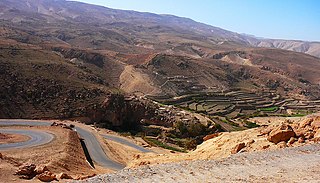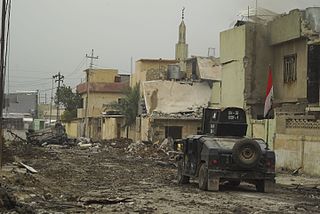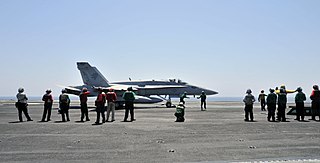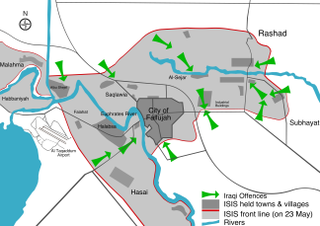
The Sinjar massacre marked the beginning of the genocide of Yazidis by ISIL, the killing and abduction of thousands of Yazidi men, women and children. It took place in August 2014 in Sinjar city and Sinjar District in Iraq's Nineveh Governorate and was perpetrated by the Islamic State of Iraq and the Levant (ISIL). The massacre began with ISIL attacking and capturing Sinjar and neighboring towns on 3 August, during its Northern Iraq offensive.

The War in Iraq was an armed conflict between Iraq and its allies and the Islamic State. Following December 2013, the insurgency escalated into full-scale guerrilla warfare following clashes in the cities of Ramadi and Fallujah in parts of western Iraq, and culminated in the Islamic State offensive into Iraq in June 2014, which lead to the capture of the cities of Mosul, Tikrit and other cities in western and northern Iraq by the Islamic State. Between 4–9 June 2014, the city of Mosul was attacked and later fell; following this, Prime Minister Nuri al-Maliki called for a national state of emergency on 10 June. However, despite the security crisis, Iraq's parliament did not allow Maliki to declare a state of emergency; many legislators boycotted the session because they opposed expanding the prime minister's powers. Ali Ghaidan, a former military commander in Mosul, accused al-Maliki of being the one who issued the order to withdraw from the city of Mosul. At its height, ISIL held 56,000 square kilometers of Iraqi territory, containing 4.5 million citizens.

Many states began to intervene against the Islamic State, in both the Syrian Civil War and the War in Iraq (2013–2017), in response to its rapid territorial gains from its 2014 Northern Iraq offensives, universally condemned executions, human rights abuses and the fear of further spillovers of the Syrian Civil War. These efforts are called the war against the Islamic State, or the war against ISIS. In later years, there were also minor interventions by some states against IS-affiliated groups in Nigeria and Libya. All these efforts significantly degraded the Islamic State's capabilities by around 2019–2020. While moderate fighting continues in Syria, as of 2024, ISIS has been contained to a manageably small area and force capability.

The 2016 UEFA Champions League final was the final match of the 2015–16 UEFA Champions League, the 61st season of Europe's premier club football tournament organised by UEFA, and the 24th season since it was renamed from the European Champion Clubs' Cup to the UEFA Champions League. It was played at the San Siro stadium in Milan, Italy, on 28 May 2016, between Spanish teams Real Madrid and Atlético Madrid, in a repeat of the 2014 final. It was the second time in the tournament's history that both finalists were from the same city. Real Madrid won 5–3 on a penalty shoot-out after a 1–1 draw at the end of extra time, securing a record-extending 11th title in the competition.
Between 1 and 15 August 2014, the Islamic State of Iraq and the Levant (ISIL) expanded territory in northern Iraq under their control. In the region north and west from Mosul, the Islamic State conquered Zumar, Sinjar, Wana, Mosul Dam, Qaraqosh, Tel Keppe, Batnaya and Kocho, and in the region south and east of Mosul the towns Bakhdida, Karamlish, Bartella and Makhmour

On 15 June 2014, U.S. President Barack Obama ordered United States forces to be dispatched in response to the Northern Iraq offensive of the Islamic State (IS) as part of Operation Inherent Resolve. At the invitation of the Iraqi government, American troops went to assess Iraqi forces and the threat posed by ISIL.
The Dhuluiya offensive was launched on 28 December 2014 by Iraqi forces backed by Sunni tribesmen and Shia militiamen on the strategic town of Dhuluiya, which had been held by ISIL for months. On 30 December, the area was recaptured and the ISIL siege on the Sunni al-Juburi tribe was broken.

The Battle of Sarrin refers to a military operation during 2015 in the northeastern Aleppo Governorate, during the Syrian Civil War, conducted by Kurdish YPG and allied forces against the Islamic State of Iraq and the Levant in the town of Sarrin, in an effort to capture the town and the surrounding region.

Wissam Najm Abd Zayd al-Zubaydi, better known by his noms de guerre Abu Nabil al-Anbari, Abul Mughirah al-Qahtani or Abu Yazan al-Humairi was a commander in the Islamic State of Iraq and the Levant (ISIL) and the leader of its Libyan branch. Al-Anbari was killed by a US military airstrike on 13 November 2015.
Shia Muslims have been persecuted by the Islamic State, an Islamic extremist group, since 2014. Persecutions have taken place in Iraq, Syria, and other parts of the world.
This article lists terrorist incidents in Iraq during 2016:

The siege of Fallujah was an offensive launched in February 2016 by the Iraqi government against the Islamic State of Iraq and the Levant (ISIL) in al-Karmah and in the city of Fallujah, with the aim of enforcing a siege of the latter. During the early stages of the operation, local Sunni residents revolted against ISIL for a period of three days. On 22 May, after completing preparations around the city, the Iraqi Army and supporting Shi'ite militias launched the third Battle of Fallujah.
The Battle of Hit, code named Operation Desert Lynx by Iraqi forces, was an offensive launched by the Iraqi Government during the Anbar offensive, with the goal of recapturing the town of Hīt and the Hīt District from ISIL. After the Iraqi forces recaptured the city of Ramadi, Hīt and Fallujah were the only cities still under the control of ISIL in the Al Anbar Governorate. Iraqi Forces fully recaptured of Hīt and the rest of the Hīt District on 14 April 2016.
This is a timeline of events during the War in Iraq in 2016.

The Yazidi genocide was perpetrated by the Islamic State throughout Iraq and Syria between 2014 and 2017. It was characterized by massacres, genocidal rape, and forced conversions to Islam. The Yazidi people, who are non-Arabs, are indigenous to Kurdistan and adhere to Yazidism, which is an Iranian religion derived from the Indo-Iranian tradition. Over a period of three years, Islamic State militants trafficked thousands of Yazidi women and girls and killed thousands of Yazidi men; the United Nations reported that the Islamic State killed about 5,000 Yazidis and trafficked about 10,800 Yazidi women and girls in a "forced conversion campaign" throughout Iraq. By 2015, upwards of 71% of the global Yazidi population was displaced by the genocide, with most Yazidi refugees having fled to Iraq's Kurdistan Region and Syria's Rojava. The persecution of Yazidis, along with other religious minorities, took place after the Islamic State's Northern Iraq offensive of June 2014.
In May 2016, the Islamic State conducted a series of bombing attacks in and around Shia neighbourhoods in Baghdad, the capital of Iraq, killing and wounding hundreds. According to ISIL, attacks were aimed at Shia fighters.

On 3 July 2016, ISIL militants carried out coordinated bomb attacks in Baghdad that killed 340 civilians and injured hundreds more. A few minutes after midnight local time, a suicide truck-bomb targeted the mainly Shia district of Karrada, busy with late night shoppers for Ramadan. A second roadside bomb was detonated in the suburb of Sha'ab, killing at least five.
On 7 July 2016, at least 56 people were killed and 75 injured after a group of attackers stormed the Mausoleum of Sayid Mohammed bin Ali al-Hadi, a Shia holy site in Balad, Iraq. The attackers included suicide car bombers, suicide bombers on foot, and several gunmen. They attacked Shia pilgrims celebrating Eid al-Fitr, which marks the end of the Muslim holy month of Ramadan. There were three suicide bombers, and one of them was killed by security personnel. There were other attackers too. ISIL also launched several mortars into the area.
The origins of the Islamic State group can be traced back to three main organizations. Earliest of these was the "Jamāʻat al-Tawḥīd wa-al-Jihād" organization, founded by the Jihadist leader Abu Mus'ab al-Zarqawi in Jordan in 1999. The other two predecessor organizations emerged during the Iraqi insurgency against the U.S. occupation forces. These included the "Jaish al-Ta'ifa al-Mansurah" group founded by Abu Omar al-Baghdadi in 2004 and the "Jaysh Ahl al-Sunnah wa’l-Jama’ah" group founded by Abu Bakr al-Baghdadi and his associates in the same year.









